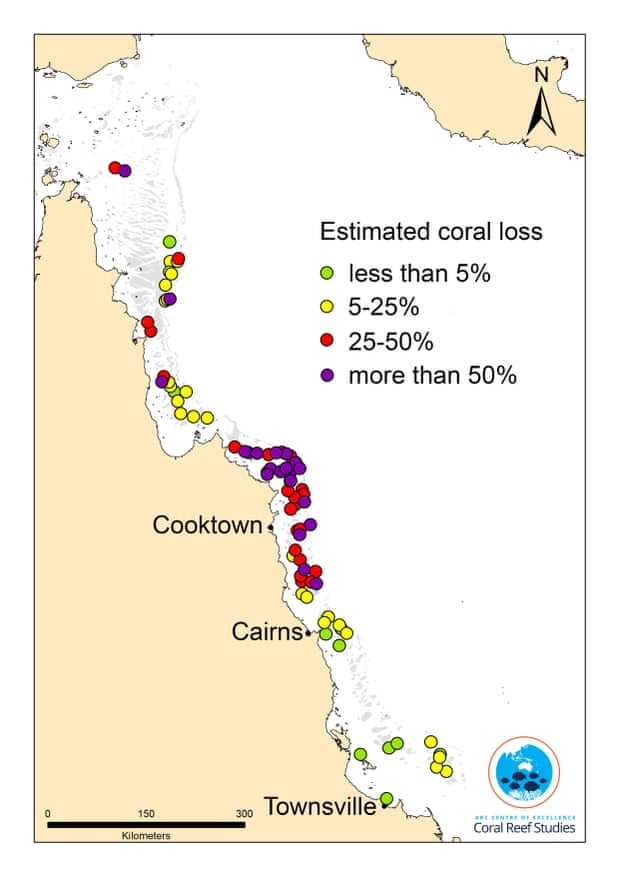
Readers may have noticed that it’s been about a month since my last article. In recent weeks I presented guest articles in place of my own pieces. The reason for my absence was due to the adoption I was finalizing in the USA (my second successful adoption!). Anyone who has adopted a child can attest to the time and travel requirements. I intend that this article marks my return to near weekly posting and I thank my readers for their patience.
Coral reefs are important for the health of the ocean biosystem; they support and harbor a high density of diverse organisms. While there are reefs located in many locations around the world, people often think first about the Great Barrier Reef off the Australian coast. It is known for its size and beauty; it brings travelers close to nature.
Scientists have investigated how reefs will fare in a changing world. The changing climate, poor management, pollution, overfishing, careless divers, and other factors may bring real risks to the health of reefs.
Just a few days ago, a world-leading organization released the results of a long-term study on the health of the Great Barrier Reef that may tell us about the health of reefs around the world. The organization ARC Centre of Excellence Coral Reef Studies found that a recent mass bleaching has killed 35% of corals on the northern and central Great Barrier Reef.
The National Oceanic and Atmospheric Administration explains coral bleaching as events that cause the coral to expel algae that live in their tissues. Following the expelling, the corals whiten in color (which is why the term bleaching is used). The coral and the algae live in a symbiotic relationship; the algae provide nutrients for the coral. Without the algae, coral can be more susceptible to disease and death. It’s important to know that the coral can recover from a bleaching, but recovery depends on the extent and duration of the event and the general health of the coral.
This year’s incredible bleaching is not a one-time event. In fact, there have been many significant regional bleaching events and three global events over the past 18 years. In the current event, the extent of bleaching depends on location. The Great Barrier Reef extends over 2000 km. In the northern sector, almost all reefs experienced bleaching. The further south one travels, the less extensive the event because the warming was not as severe.

Map of estimated coral loss on the Great Barrier Reef in June 2016, Australia. Illustration: ARC Centre for Excellence in Coral Reef Studies
I asked coral-reef expert John Bruno about this new study and he provided some excellent insights. He told me that this bleaching event is getting a lot of attention because it is the Great Barrier Reef – an iconic place that is close to pristine. It has also escaped the fate of most of the world’s reefs. But, within the scientific community, this bleaching isn’t a surprise. Dr. Bruno told me:
We’ve been witnessing this sort of event for over 30 years. In fact, the Australians have been warning the rest of the world that if we managed our reefs better, we wouldn’t see so many bleaching events.
A very influential paper published in Science in 2003 hypothesized that mass coral mortality events and subsequent population decline only happen where and when fishes have been over-harvested and pollution has weakened the corals and encouraged seaweed growth.
Dr. Bruno told me that this study generated the paradigm of “managed resilience” in coral reef ecology. The central theme is that better management of fishing and pollution makes reefs more resilient to bleaching and allows reefs to more easily recover if an event occurs. But the foundation of this paradigm has been challenged by the fact that nearly every critical test has shown it ineffective. So, the connections of warming oceans, pollution, management, fishing to bleachings are still being investigated. He further told me:
Beyond demonstrating once again that emissions and ocean warming are causing massive coral loss, this study demonstrates that even remote, well-managed, and barely impacted reefs are susceptible to bleaching and ocean warming. The intact food webs, large predatory fish, and lack of pollution have clearly not made the northern Great Barrier Reef more resistant to ocean warming than reefs near large cities. In fact, this finding is concordant with numerous past studies that have found reefs with higher coral cover (such as reefs in Marine Protected Areas) are more vulnerable to climate change, simply because they tend to be dominated by coral species that are very sensitive to anomalously high ocean temperatures.
What I didn’t realize is that there are also mass bleachings in the Indian Ocean and central Pacific which are getting much less attention.
Posted by John Abraham on Friday, 10 June, 2016
 |
The Skeptical Science website by Skeptical Science is licensed under a Creative Commons Attribution 3.0 Unported License. |